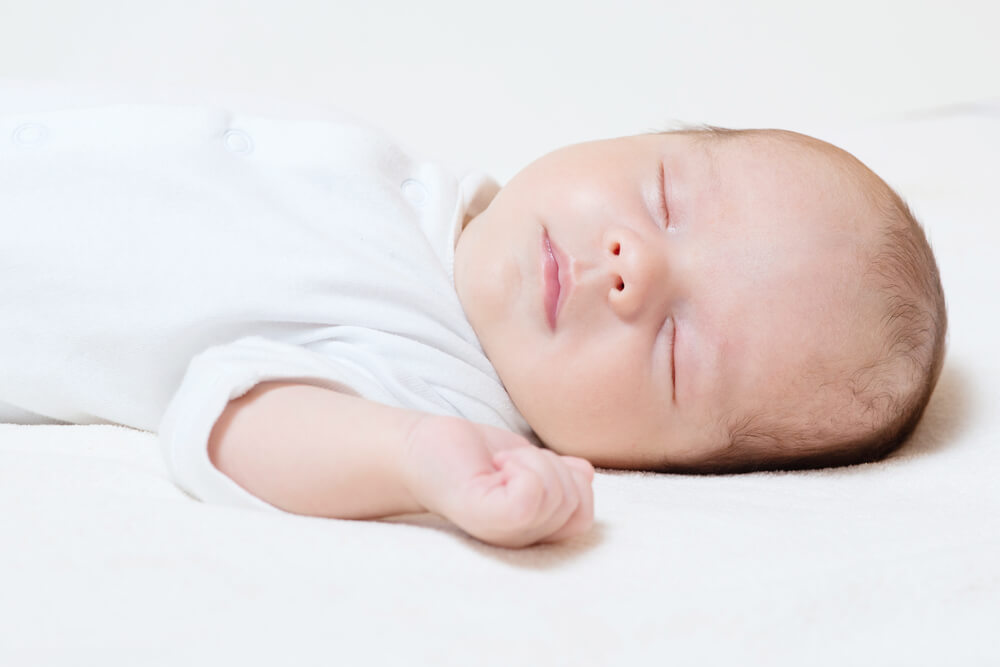What is co-sleeping? How can I safely co-sleep with a newborn baby? Find out the safest ways to keep your baby close at bedtime.
Co-sleeping has become somewhat of a controversial topic among mothers and early childhood experts. This is most likely due to the association of co-sleeping to bed-sharing with your baby.
In fact, both bed-sharing and room-sharing are considered types of co-sleeping arrangements and each one has passionate followers and subscribers. In this article, we are discussing safe co-sleeping so that you can determine what sleeping arrangement is right for your family.
What is Co-Sleeping?
Co-sleeping is a broad term to define a sleeping arrangement in which a baby sleeps close to, or near their parent. Essentially, sleeping close enough that the baby knows their caregiver is nearby.
This can mean one of two things. When a baby and their parent share the same bed or sleeping surface, this practice is known as bed-sharing. When a baby is sleeping in a bassinet, crib, or bedside co-sleeper in the same room as their parent, this is referred to as room-sharing.
Safe co-sleeping with your baby relies on your understanding of the benefits and risks associated with co-sleeping arrangements.
If you want to learn more about baby sleep, be sure to sign up for Dr. Rebecca Spencer’s Masterclass about Baby & Toddler Sleep Essentials to prepare for sleep challenges with your little one.
Is Bed-Sharing With My Baby Safe?
Bed-sharing is a common practice in most parts of the world. There are many cultural factors that may contribute to the low risk involved with bed-sharing with your baby in other parts of the world, whether it is a matter of bedding, mattress firmness, or other cultural practices.
However, supporters of bed-sharing as a co-sleeping arrangement do cite a variety of benefits for keeping their newborn as close as possible. There are also a few studies that support these claims.
Some of the recognized benefits of bed-sharing are:
- Helps baby and mother get more sleep
- Helps to make breastfeeding at night easier
- Increases the length of time a mother spend breastfeeding
- Increases the amount of close bonding time a mother has with her baby
- Helps baby fall asleep faster and stay asleep longer
There are a number of other benefits that are promoted and discussed amongst advocates for bed-sharing with your baby. However, it is important to note that many of these benefits can also be enjoyed and experienced through room-sharing, with less risk.
What Are The Risks of Bed-Sharing?
The American Academy of Pediatrics (AAP) states that bed-sharing with your baby, especially babies younger than 4 months old, are at an increased risk of suffocation, strangulation, and Sudden Infant Death Syndrome (SIDS).
In part, this is due to the many safety hazards that an adult bed poses for small infants and babies. Soft mattresses, extra blankets, bedding, and pillows, headboards, bed frames, loose cords, and other components of an adult sleeping area can quickly lead to a number of fatal accidents.
The risk of SIDS increases exponentially when bed-sharing when combined with these factors:
- Sleeping with a parent that drinks or uses drugs
- Sleeping with a parent that smokes
- Sleeping between two parents
- Sleeping with other children
- Sleeping with extra bedding and pillows
- Sleeping with a parent that is sleep-deprived or over-tired
Whether or not you decide to bed-share with your baby, these very real risks should be an important part of your decision-making process.
How to Safely Co-Sleep
Room-sharing is undoubtedly the safest option for co-sleeping with a newborn. Many health experts actually recommend room-sharing as a co-sleeping arrangement for at least the first 4 months of your baby’s life, and up to the first year when possible.
Safe co-sleeping has a number of benefits for both parents and their newborn baby, including a reduced risk of SIDS. Keeping your baby close by, sleeping in the same room can lower the risk of SIDS by up to 50%.
Parents who choose to room-share with their babies also have an easier time with nighttime feedings, diaper changes, and improved sleep quality.
You can choose to have your baby sleep in a bassinet, crib, or portable play-yard sleeper next to your bed or close by in your bedroom. You may also choose to purchase a bedside co-sleeper that attaches to the side of your bed to keep your little one as close as possible while safely co-sleeping.
Ultimately, the decision to co-sleep with your baby is a personal decision for you and your family to make. How you decide to co-sleep is also a personal and individual decision.
While bed-sharing is not recommended for a number of health and safety risks, if you do decide to choose bed-sharing for your family, there are a few ways to ensure you are co-sleeping as safely as possible.
If you are planning on bed-sharing with your baby:
- Always put your baby to sleep on their back.
- Make sure your baby is dressed lightly to avoid overheating.
- Never let your baby sleep alone in bed.
- Make sure your mattress is firm. Do not bed-share if you have a waterbed.
- Check your headboard and footboard and make sure there are no openings or cutouts that your baby can get caught or trapped in.
- Never cover your baby’s head or face while they are sleeping.
- Remove all pillows, comforters, and other soft items that can cause suffocation.
- Make sure your bed is not located near blinds or other items that have cords or wires close to your baby.
- Never fall asleep with your baby on your chest or on top of you, or resting in your arms.
- Do not smoke, drink alcohol, or take any drugs that can alert your ability to be woken up or impair your judgment.
- Do not bed share with a baby under the age of 4 months old or were premature or had a low birth weight.
Is Co-Sleeping Right For You?
There are so many decisions you will need to make as a new parent adjusting to life with your baby. Whether or not to co-sleep with your newborn is just one of them.
Room-sharing is the safest way to co-sleep with your baby and choosing to room share for at least six months can provide so many wonderful benefits for you and your little one! While bed-sharing can seem easier and at times more enticing, be sure to understand the risks and necessary safety measures you will have to follow to keep your baby safe.
No matter what sleeping arrangement you choose, Kinedu is here to support you and your baby. Download our app today to access individual guidance from experts in early childhood development.








